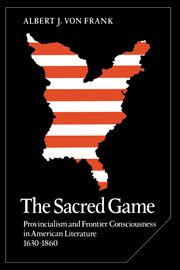Book contents
- Frontmatter
- Contents
- Dedication
- Preface
- Introduction: provincialism and the frontier
- 1 “But enmity this amity did break”
- 2 Brother Jonathan
- 3 “A musy in the thicket”
- 4 Geoffrey Crayon and the gigantic race
- 5 Hawthorne's provincial imagination
- 6 Working in Eden
- 7 Life as art in America
- 8 Reading God directly: the morbidity of culture
- Postscript: tradition and circumstance
- Notes
- Index
7 - Life as art in America
Published online by Cambridge University Press: 07 October 2011
- Frontmatter
- Contents
- Dedication
- Preface
- Introduction: provincialism and the frontier
- 1 “But enmity this amity did break”
- 2 Brother Jonathan
- 3 “A musy in the thicket”
- 4 Geoffrey Crayon and the gigantic race
- 5 Hawthorne's provincial imagination
- 6 Working in Eden
- 7 Life as art in America
- 8 Reading God directly: the morbidity of culture
- Postscript: tradition and circumstance
- Notes
- Index
Summary
We lead a life of glimpses & glances. We see nothing good steadily or long, and though love-sick with Ideas they hide their faces alway.
– Emerson to Margaret Fuller, October 20, 1836Of all the circumstances that contributed to the shaping of Margaret Fuller's mind and career, perhaps none was more fatally decisive than the provinciality of her environment. For most of her life, lacking the perspective of foreign travel, she could scarcely gauge the meaning of the handicap she labored under; but she nevertheless felt its constraints from an early age. Only on arriving in Italy in 1846 could she acknowledge that for once her surroundings were adequate; and by then, the mental irritant of provincial conditions removed, her major work was over. As Henry James seems to have understood, Fuller was, and remains, the best example of the American scholar-artist of the antebellum period, the one figure of her time from whom the clearest insights may be had concerning the effects of cultural attenuation on the ardent, aspiring mind.
These effects, peculiar as they were to the American scene, are for the most part so far from being regrettable that one insists on her provincialism just as James insisted on Hawthorne's – “not in the least in condemnation, but, on the contrary, in support of an appreciative view.”
- Type
- Chapter
- Information
- The Sacred GameProvincialism and Frontier Consciousness in American Literature, 1630–1860, pp. 114 - 135Publisher: Cambridge University PressPrint publication year: 1985



